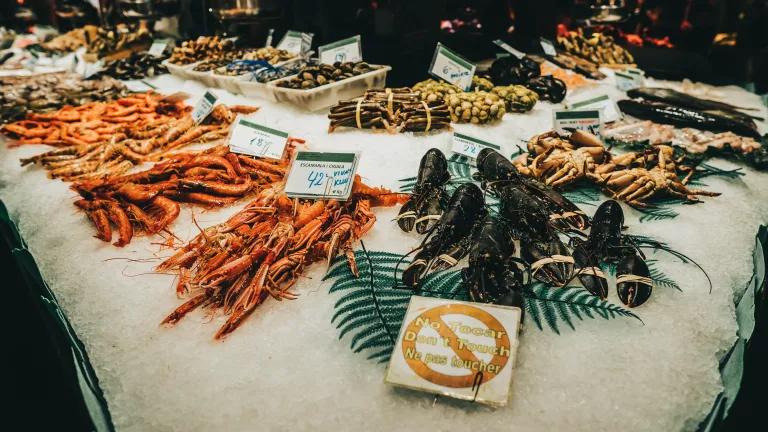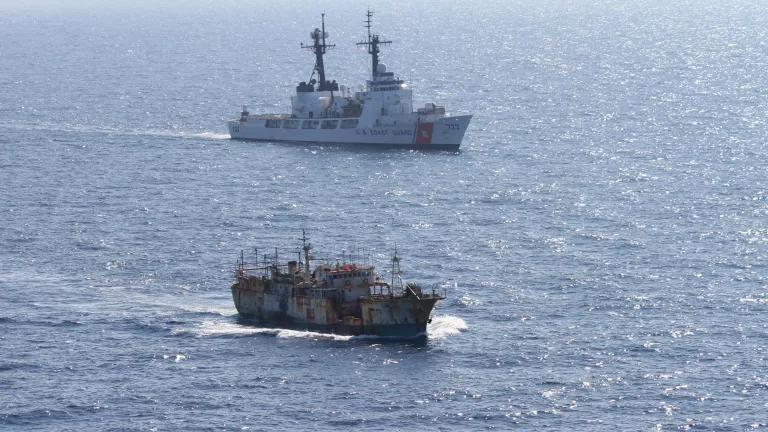Russian Seafood Ban Without Traceability Questioned
President Biden’s ban on Russian seafood is futile without expanded traceability requirements from NOAA.

After Russia’s senseless invasion of Ukraine, President Biden issued an EO imposing a ban on the importation of Russian seafood. Yet, as illuminated during the House Natural Resources Committee oversight hearing yesterday, a ban on Russian seafood isn’t as clear-cut as you would think. Due to the lack of seafood traceability across the supply chain, the story is far more complicated.
For the United States, banning Russian seafood imports is no small business - we imported more than $1.2 billion in crab, cod, and other fish from Russia in 2021. Banning Russian seafood starts to get complicated due to a lack of traceability and transparency in the seafood industry. Under current import requirements, a fish illegally caught in Russia can be sent to China to be processed and then imported to the United States as a product of China, thus masking its origins and undermining the effort to exclude Russian products from U.S. commerce. According to a 2021 report by the International Trade Commission, Russia is a top source of IUU-caught seafood imports, and fully one-third of processed wild-caught fish imported from China in 2019 was actually caught by Russian vessels.
Unfortunately, under our current system, it’s hard to tell where most of the fish on our plates actually comes from. Adding to that complexity, the U.S.’ own traceability system only applies to about 45 percent of seafood imported into the United States, creating a gaping loophole for anyone trying to get away with selling illegal seafood. For more on this, one of the hearing witnesses, Sally Yozell of the Stimson Center, published an op-ed in the Seattle Times, Are you sure the seafood you just bought isn’t Russian?

Representative Huffman of California
Chair of the Water, Oceans, and Wildlife subcommittee, Rep. Jared Huffman of California, began yesterday’s hearing by hitting at the heart of this issue: “How will it actually work if most of the seafood is not tracked?”. After giving multiple examples of illegal fishing and forced labor in the seafood supply chain - citing the well-documented routine human rights abuses that occur at sea and in processing facilities, he shared that the National Oceanic and Atmospheric Administration (NOAA), the agency with ownership over the Seafood Import Monitoring Program (SIMP), declined to testify at the hearing. Rep. Huffman, who has championed legislative reforms to expand the SIMP to all species imported into the U.S. in H.R.3075, repeated throughout his statement that “NOAA has not acted,” underscoring the lack of agency action on this issue despite strong calls from Congress to do so.

Sally Yozell
Sally Yozell, senior fellow and director of environmental security at the Stimson Center, started off the hearing strong sharing that, “Despite the good intentions to strike an economic blow to Russia after its unprovoked invasion of Ukraine, this ban will not work without full seafood traceability, and real information on the origin of the catch.” Further, she stated the obvious: “When it comes to rebranded Russian catch, American consumers do not want to buy it, and chefs do not want to serve it.”

Dr. Tabitha Mallory
Dr. Tabitha Grace Mallory, founder and CEO of The China Ocean Institute noted that “According to one index, in 2021, China scored the highest in the world on measures of illegal, unreported, and unregulated (IUU) fishing, and Russia scored the second-highest”. This means that two of the countries with some of the highest rates of illegal fishing and forced labor are still able to import their product into the U.S. Almost all the witnesses, including Dr. Mallory, called for an expansion of the SIMP program noting that, “A more robust U.S. traceability program would decrease the chances that the U.S. is importing seafood that originates not only from places like Russia, but also from IUU fishing activity in places like, North Korea, Indonesia, some South American countries, and on the high seas as well.”

Austin Brush
Austin Brush, a senior analyst at The Center for Advanced Defense Studies outlined clearly what the problem is and what is needed; “Lacking transparency and traceability is a major obstacle to the successful implementation of Russian sanctions and the recent seafood import ban. The expansion of SIMP to encompass all seafood species entering the United States, chain of custody data, and beneficial ownership reporting is critical to ensuring that Russian seafood cannot enter the United States.”
After Rep. Huffman’s strong start to the hearing, Rep. Ed Case of Hawaii questioned NOAA’s absence and asked further questions about why traceability is so key to making this ban effective. In a show of bipartisan support, Rep. Garret Graves of Louisiana, an original cosponsor of the Illegal Fishing and Forced Labor Prevention Act (H.R. 3075) with Rep. Huffman, focused on the larger goal of seafood traceability to enable the U.S. to crack down on forced labor at sea and prevent illegal seafood from entering the lucrative U.S. seafood market. He shared that consumers deserve to have a choice, and that we need to level the field for fishermen who play by the rules. The objective of H.R. 3075, he asserted, is to hold “countries like China and Russia accountable that have some of the worst illegal fishing fleets in the world. It is unfair competition, it’s overfishing, it’s lack of sustainable practices. These are objectives that we should all be sharing.” Rep. Jenniffer Gonzalez-Colon of Puerto Rico also questioned witnesses on the concerning loopholes in seafood traceability and the need to close them with respect to Russian seafood.
President Biden’s ban on Russian seafood imports is shining a light on the deficiencies and permissiveness of the U.S. seafood import system and what is needed for seafood traceability and transparency. The calls for an expansion of SIMP to all species from democrats, republicans, and witnesses alike rang clear in this hearing. As Austin Brush it, “As a major importer of seafood and a leader in effective fisheries management, the United States has an opportunity to set the gold standard for transparency and traceability in the seafood industry by implementing these changes.” The current system, and thus the ban on Russian seafood, won’t be effective until NOAA expands this program. Significant portions of Rep. Huffman and Rep. Grave’s bill, H.R. 3075, were included in the House-passed COMPETES. Enacting these provisions to combat illegal fishing and forced labor through the final innovation and trade package would be a critical step for U.S. leadership in addressing IUU fishing and human rights abuses in the seafood sector.
Sally Yozell laid out potential the next steps beautifully stating that,
- “The President could issue an executive order tomorrow;
- NOAA could show leadership and propose an emergency rule;
- or Congress could pass the bipartisan SIMP provisions included in the America COMPETES Act and appropriate the funding needed for NOAA to adequately implement a robust SIMP.”
Fortunately, there is a clear path to fully stopping the importation of “Putin’s pollock.” NOAA has the ability to impose traceability requirements which track all seafood through the supply chain before it enters the country.




